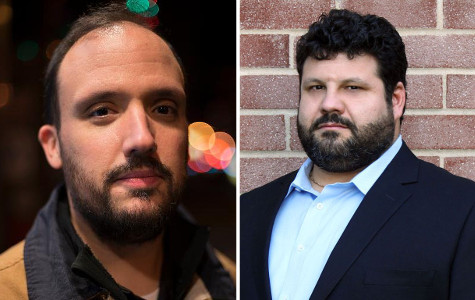
You’d be hard-pressed to find crime-fiction protagonists more different than Jay Desmarteaux and Pete Fernandez. One is a grizzled ex-con, the other a washed up ex-journalist struggling to be a PI. And while they’re not really running in the same social circles, both come from the minds of two crime-fiction contemporaries in Thomas Pluck and Alex Segura.
The 1st Jay novel, Bad Boy Boogie, is out now, and the 3rd Pete Fernandez Miami Mystery, Dangerous Ends, hit on April 11. We grabbed both authors and stuck them in a virtual room together to talk about their influences, how their series came to be, and what’s in store for their characters in the pages of their new releases.
Alex Segura: Thomas, let's talk influences. What are the books that you think of as integral to the DNA of your new book, Bad Boy Boogie?
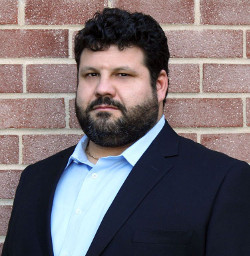
Thomas Pluck: My favorite series characters are Richard Stark’s Parker, Lawrence Block's Keller, James Lee Burke's Dave Robicheaux and Clete Purcell, Robert Crais's Elvis Cole and Joe Pike, and Joe Lansdale's Hap & Leonard. A reviewer called Bad Boy Boogie “Burke meets Parker on steroids,” and I blushed—those are big shoes to fill.
But Jay's also got a bit of Stark’s Grofield in him. He'll crack a joke; he uses humor to deflect from a bad situation from consuming him, so I'd say he has Parker's relentless drive and perhaps Clete’s or Cole's sharp retorts.
Jay was born when I decided I wanted my “bad boy” and “hero” to be the same person. I didn't want him to have a sidekick who got their hands dirty, he's more than happy to do that himself.
How about Pete?
Dangerous Ends is the 3rd Pete Fernandez novel. Did you start the series knowing you had more than one story to tell? Were there milestones for him in your imagination, or do you wing it?
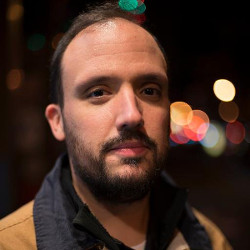
AS: Pete Fernandez has a little Block in him too, though I think he's much more Scudder than Keller. I also drew a lot of inspiration from Dennis Lehane's Kenzie and Gennaro books, Laura Lippman's Tess Monaghan series, and the Nick Stefanos trilogy by George Pelecanos. Detectives who are still figuring out their lives and whether they want to take a stab at this as a full-time goal.
All those books are also really big on location and a sense of place, which is what I try to do with Miami in the Pete series. You also can't write a Miami crime book without tipping your hat to Vicki Hendricks, Elmore Leonard, Charles Willeford's Hoke Moseley books, or James W. Hall, so they're all definitely part of Pete's literary makeup.
As for the series: I knew pretty early on—probably midway through the writing of the first Pete book, Silent City—that I wanted to see his journey through, from washed out ex-journalist to somewhat-competent PI. That's kind of where you find him at the beginning of Dangerous Ends—he's overcome his demons and is trying to live a saner, less complicated life. Unfortunately, that's not how life works.
In terms of a bigger arc, though, I knew I wanted his 2nd adventure to really drag him down—to show him the true depths of despair and leave him with pretty much nothing. That makes the next book about not only rebuilding his life, but trying to see what's worth saving. It's a story about redemption and coming to terms with your past and how it makes you who you are, while also being aware that there are things you can change. That we're not completely beholden to what's come before.
Can you talk a bit about what got you into crime writing? How did you join this crazy tribe?
TP: My grammar school library had a lot of Encyclopedia Brown, and the spinner rack in my 7th grade English classroom had Agatha Christie. I've been hooked ever since. Then Ian Fleming and the Gregory MacDonald “Fletch” books. I didn't read Dashiell Hammett until college. I majored in English Lit, read the classics and modern literature—but I never found people like my family until I read crime fiction and horror. Working class people with one foot in the outlaw life.
I grew up eavesdropping on my cousins, aunts, and uncles at my grandmother's kitchen table as they talked about the cops hassling them at their bar, what fell off a truck, how they got revenge on a nasty customer at the cocktail bar, or how they paid off the inspector at their garage. My hometown of Nutley—which is featured in Bad Boy Boogie—has an “industrial” blue collar side and a verdant, park-filled side—the side that Martha Stewart came from. We lived on the literal other side of the tracks from her.
My grandmother went to town hall and asked the mayor to replace the bulbs in our streetlamps because the cars couldn't see us kids playing at night. He told her, “If you don't like it, move.” So I knew where I belonged, and it wasn't in Mayberry.
How about you, what drove you to a life of crime fiction?
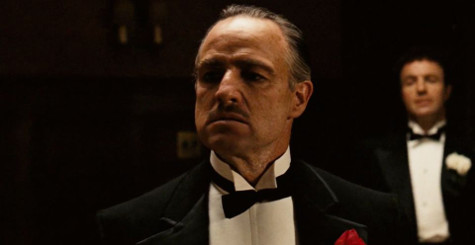
AS: I was an English Lit major, too. I went through a long literary fiction phase, which I think was really helpful in deciding to write—at least in general. But it was returning to my love for crime and noir fiction that showed me what I wanted to write. Before college, I pin the blame squarely on Mario Puzo's The Godfather—which I swiped from my grandfather's house when I was a kid. That book, which is much pulpier and more visceral than the Coppola film, left a lasting impression on me and led me to seek out more gangster movies, true crime books—including former mafioso tell-alls—and, eventually, stuff like Doyle's Sherlock Holmes stories and some Agatha Christie. Eventually, that opened the door to a crash course in the masters like Chandler, Hammett, Jim Thompson and Ross Mcdonald.
I have a lot of fondness for the Lew Archer books and John D. MacDonald's Travis McGee novels, even though the Pete books—aside from setting—aren't like either. Pete changes a ton from book to book, whereas Archer and McGee are somewhat static. But in terms of plot and mood, those two were hard to beat. Mcdonald, in particular, was a master when it came to showing the conflict and psyche of “bad guys”—in effect, revealing that they're not really evil or black hats but actually products of their situations. Stuff I think about a lot when writing my own novels.
What books are you reading these days from contemporaries that get you excited for mystery and crime fiction?
TP: Yes, no one thinks they're the villain. I enjoy reading static characters such as Jeeves and Bertie Wooster, or Bernie Rhodenbarr by Lawrence Block, but I'm not sure I could write such a novel. My Denny the Dent short stories are static, he always goes home to the junkyard with the dogs.
But to get to your question, contemporary crime is exciting as ever. A writer who always knocks me for a loop is my fellow Jerseyan Jen Conley. Her collection Cannibals: Stories from the Edge of the Pine Barrens is just fantastic. Great writing about real, struggling people. Megan Abbott is another, and I mean her recent suburban noir tales—or domestic suspense. She obsesses on a subject like competitive cheerleading or overzealous parents of gymnasts and drags you into the ugly side of it.
Read a review of Cannibals: Stories from the Edge of the Pine Barrens!
Wallace Stroby with his Crissa Stone series; she's great. Real hardboiled, no BS heist tales. And Don Winslow with The Cartel; he's written a truly epic novel that shows the disaster of the drug war. But also Savages, which reads like some new wunderkind wrote it. And it's not out yet, but Danny Gardner's A Negro and an Ofay—set in the '50s with a biracial ex-cop navigating the white and black worlds of greater Chicago, one of the most segregated cities in the nation—is knocking me out right now.
Who's got you excited these days?
AS: I'll second Jen and Megan—I loved Cannibals and count Megan as a big influence. You Will Know Me was one of the best books I read last year. So good, I read it twice. I'll scramble to grab a Don Winslow book whenever it comes out, as well, and I'm very excited for his next one, The Force. I thought The Cartel was an amazing tour de force. I think he has a way with world-building that is unparalleled in crime fiction. He really does the big picture in a way I haven't seen since James Ellroy's American Underground books.
I really loved Robin Wasserman's Girls on Fire. Very strong adult fiction debut. I also thought Melissa Ginsburg's Sunset City was a great, proto-PI novel—raw and unnerving in the way you want fiction to grab you. She was able to set the mood and create memorable characters, and the book stuck with me for a long time.
I really like what Dave White is doing with his Jackson Donne books. The new one, Blind to Sin, is particularly ambitious and good. I'm also really happy to see Reed Farrel Coleman's Gus Murphy series get so much praise. Where It Hurts was a strong 1st installment, and the 2nd, What You Break, was just as entertaining if not better. Julia Dahl and Erica Wright are also writing memorable, hard-to-put down series too.
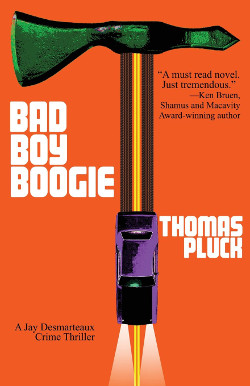
TP: How about music? Bad Boy Boogie gets its title from an AC/DC song, and their early albums had an outlaw edge that spoke to me. Dirty Deeds Done Dirt Cheap and all that. Warren Zevon, too. His father was mobbed up, and that influenced his work.
AS: Music's a big part of the Pete books, for sure. I love Bad Boy Boogie as a title. It fits the mood of the novel perfectly. For me, I find that I listen to a lot of Velvet Underground, Springsteen, Steve Earle, Neko Case, certain Elvis Costello albums, Decemberists, and Jason Isbell when thinking about the Pete novels. Songs about outcasts on the fringe battling demons external and internal. Those are the songs that stand out. I usually try to put together playlists for each book, just to have a way to get into the mood or mindset of the novel whenever I need to.
Do you listen to music while writing? I find it extremely distracting, so most of my music/writing brainstorming happens when I'm not putting words into the manuscript.
TP: I almost always listen to music while writing. I'm kind of neurotic that way. I'll pick an album or two—or even an entire discography—that fit the scene or the character and put them on repeat. Creedence, Thin Lizzy, the Pogues, the Black Keys, Marvin Gaye, Steve Earle. The Raveonettes, Metric, Joan Jett, Bikini Kill, and the Ramones have all done duty.
I can't have TV on, though. And while I admit that TV is the new frontier for serial fiction, I watch very little. Underground is one I watch; that’s delicious historical pulp. Loved The Wire, of course. But I try to stick to comedy, like Louie, or miniseries. I do like Hap and Leonard. Lansdale's living the dream. He's another hero of mine with how he jumps the genres.
Do you think we'll have a harder time competing with people bingeing TV? I find novels getting shorter and faster, at least in thriller and crime.
AS: Just started Hap and Leonard, too. Great stuff that really translates well. I'm not a big TV person, either. It's a byproduct of having a one-year-old and not really wanting to spend so much time staring at a screen. I'd rather read a book or listen to one and multitask on something else. We've been rewatching The West Wing and The Sopranos, which are interesting ends of the same spectrum—one is hopeful in the face of daunting odds, the other one is dark and often funny but also really about family as opposed to work. Both are great for really different reasons.
I think there's so much competition across the board—from video games, TV, movies, news, whatever, it's almost hard to gauge what's taking up more attention. I do find books and TV (especially network television) are getting shorter—quicker cuts, less characters, and more character through plot—which doesn't resonate with me as much. I like the slow boil. I like to really get a feel for the world and the people so I can get invested. The Wire is a great example of that, or Fargo if we want to talk about recent TV. The Americans is another favorite.
A few people that read Dangerous Ends likened it to older PI fiction, which I took as a compliment. Did you have a certain type of book in mind when you started working on BBB? Did it achieve what you wanted?
TP: The Americans is based on the Russian spy family that was caught in the town I live in now, by the way. And Tony Soprano's house is about a block from my local watering hole. Harlan Coben writes about this area a lot; Brad Parks too. There's a lot to write about here.
This is a book I've wanted to write for a long time. The basic idea percolated in my head for a decade, taking different forms from different characters' points of view. I wanted to share the world I grew up in—where you're afraid of the police and the mob at the same time, where you're too hard for your middle-class preppy friends and too soft for the friends who carry ice picks and steal.
I'm not the first to write about how suburbia isn't the most welcoming of places, but I wanted to tell a story about it that was both thrilling and contemplative, violent and tender, and I hope I've done it. I have more Jay Desmarteaux stories to tell—the next one is set in Louisiana, from Angola Prison to Baton Rouge to where Bonnie and Clyde were ambushed.
What's next in store for Pete?
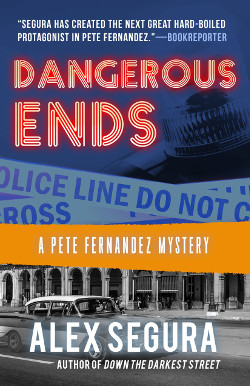
AS: Wow, it seems like you're the nexus of all great television. Maybe I should have set the Pete books in your town too! They film The Americans around our hood sometimes, I think.
I'm excited to read the next Jay book. I thoroughly enjoyed Bad Boy Boogie—it felt really of the moment, and it's always good to read a story that you know can only come from the person writing it.
Well, Pete isn't in the best shape by the end of Dangerous Ends, without spoiling too much. So, the next book, tentatively titled Relics, pushes that forward. I don't want to spoil anything, but it's unlike anything in the series yet, while still trying to remain true to what makes Pete and his supporting cast interesting.
After Silent City, which basically pulled Pete into the world, and Down the Darkest Street, which was my stab at a serial killer book, and now Dangerous Ends, which takes more of a big-picture approach to Pete and his place in the world, I really wanted to get down and dirty and deal with something more grounded and, arguably, more deadly. It's a book about regrets and discovering you can't go back and fix your mistakes, but you can maybe prevent the same thing from happening again.
This was fun, man. Glad we could make it work.
Learn more about or order a copy of
| Dangerous Ends | opens in a new window |
opens in a new window |
| Bad Boy Boogie | opens in a new window |
opens in a new window |
Alex Segura is a novelist and comic book writer. He is the author of the Miami crime novels Silent City and Down The Darkest Street, featuring newsman-turned-P.I. Pete Fernandez. He has also written a number of comic books, including the bestselling and critically acclaimed Archie Meets Kiss storyline, the “Occupy Riverdale” story, and the upcoming Archie Meets Ramones. He lives in New York with his wife. He is a Miami native. Follow him at @alex_segura.
Thomas Pluck is the author of Bad Boy Boogie, a Jay Desmarteaux crime thriller coming from Down & Out Books in March, and Blade of Dishonor, an action adventure which MysteryPeople called “the Raiders of the Lost Ark of pulp paperbacks.” He has slung hash, worked on the docks, and even swept the Guggenheim museum (but not as part of a clever heist). He hails from Nutley, New Jersey, also home to criminal masterminds Martha Stewart and Richard Blake, but has so far evaded capture.

Excellent piece. The consistency with which you update this blog is impressive. Very helpful, especially the end section where I had to do some mental processing thanks to the wheel spinner. This is the answer I’ve been seeking for quite some time.